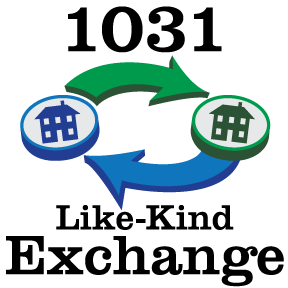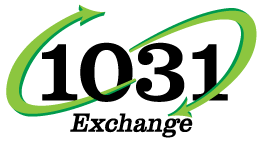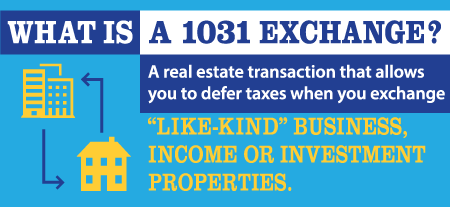What a real estate broker should do as part of a 1031 exchange
Mark Sanguinetti as a California licensed real estate broker working with a property investor conducting a 1031 exchange is able to perform the following duties:
Provide information that a 1031 Exchange is an option for any property sale pertaining to any business or investment property, or any owner occupied property sale that has an investment component. For example, a house with a farm that produces saleable farm goods, a house with a unit in the back that is being rented, a building where someone is conducting their business, etc. It is recommended that the, for sale property owner talk to their tax and/or legal advisors about their specific situation. Any tax or legal information provided by a real estate agent should be secondary to the information provided by your accountant and legal advisor, especially as this pertains to the specific information pertaining to an actual 1031 exchange transaction that you are participating in. Your accountant should have specific financial information pertaining to your owned and for sale properties, while any information provided on this site is general information and not specific to your actual 1031 exchange needs.
Explain that the appropriate 1031 Exchange language needs to be added to the Purchase and Sale agreement, or as an attachment to the agreements as an addendum. real estate broker, Mark Sanguinetti can assist with this process in working with his clients chosen intermediary, financial lender, property inspector, tax accountant, title comapny, escrow company and/or legal advisor. A 1031 exchange account needs to be opened before the close of escrow for the sale of a property involved in a 1031 exchange. To open the account, you can work with real estate agent Mark Sanguinetti at 415-883-2270 and as an option his recommended intermediary Asset Exchange Company at 877-471-1031.
 The replacement property or properties that need to be purchased under a 1031 exchange require a strict timeline. The first timeline is the identification and selection of the possible for purchase properties within 45 days of the close of escrow for the sale of your property for your 1031 exchange. This must be done in writing with the properties clearly stated. This identification needs to be sent to your Intermediary, for example Asset Exchange Company. For a real estate agent working with their 1031 exchange property owner client this 45 day period could require the most and quickest for sale property evaluation with the client in the property exchange making the final decision as to which properties to choose. Mark Sanguinetti can do a lot of property research for his client in helping him or her make their decision on possible for purchase properties.
The replacement property or properties that need to be purchased under a 1031 exchange require a strict timeline. The first timeline is the identification and selection of the possible for purchase properties within 45 days of the close of escrow for the sale of your property for your 1031 exchange. This must be done in writing with the properties clearly stated. This identification needs to be sent to your Intermediary, for example Asset Exchange Company. For a real estate agent working with their 1031 exchange property owner client this 45 day period could require the most and quickest for sale property evaluation with the client in the property exchange making the final decision as to which properties to choose. Mark Sanguinetti can do a lot of property research for his client in helping him or her make their decision on possible for purchase properties.
The next timeline is the 180 day period, which also begins after the close of escrow for the sale of your property. This period extends beyond the first 45 day period by 135 additional days. A property can be purchased any time during this 180 day period including during the first 45 days of property evaluation, but the close of escrow for the newly purchased property or properties must be no later than this 180 day period. If, however, the due date of the exchanger’s tax return for the year during which the relinquished property was transferred is before the end of the 180 day period, the due date of the tax return is the end of the 1031 exchange period. Because the due date of the tax return includes extensions, the exchanger by filling out a tax return extension in a timely manner, which is form 4868, can then allow that the exchange period does not end prior to the end of the 180-day period. It is recommended that the exchanger work with his or her accountant for this form 4868 extension. This will extend the final due date for income tax filing from the middle of April to middle of October, for example depending on the exact year with calendar, April 15 to October 15. This will allow you extra days to finalize your purchase of property within your 180 day 1031 exchange period. The date of April 15 above was used because it is better to be early than risk being late. Below is a link from the Internal Revenue Service web site for the form 4868 extension for the tax year 2015 downloadable through a pdf file. And on this form is written “File Form 4868 by April 18, 2016.
During this time period Mark Sanguinetti, as a licensed real estate broker can work with the escrow company and the Intermediary and whoever else the principal 1031 client wants me to work with. This can also involve, for example, a contractor used to evaluate the construction of the buildings and other property evaluation professionals.

